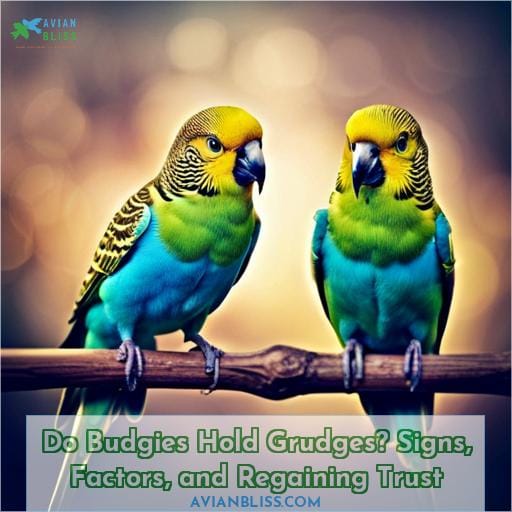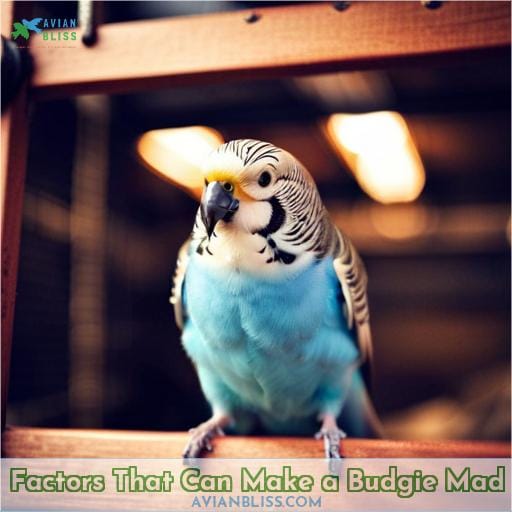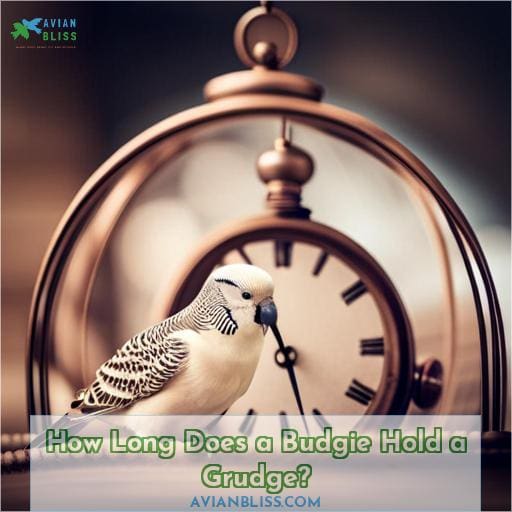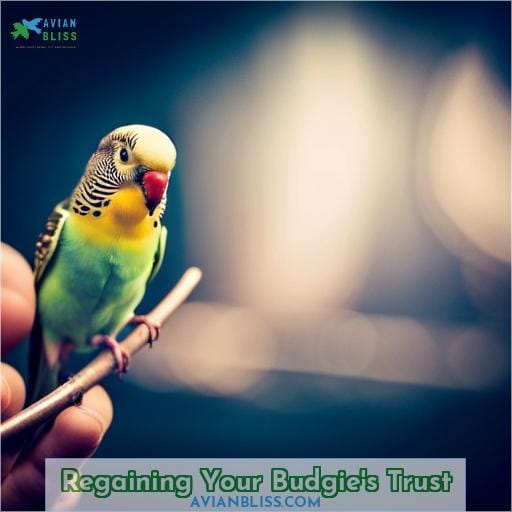This site is supported by our readers. We may earn a commission, at no cost to you, if you purchase through links.
 Imagine this: you come home after a long day, excited to spend time with your budgie. But instead of chirping happily and flying over to greet you, it hides in the corner and refuses to interact with you.
Imagine this: you come home after a long day, excited to spend time with your budgie. But instead of chirping happily and flying over to greet you, it hides in the corner and refuses to interact with you.
In this article, we will explore signs that indicate if budgies hold grudges, factors that can make them mad, and how to regain their trust.
Table Of Contents
- Key Takeaways
- Signs Your Budgie Holds a Grudge
- Factors That Can Make a Budgie Mad
- How Long Does a Budgie Hold a Grudge?
- Regaining Your Budgie’s Trust
- Can Budgies Forgive and Forget?
- Tips for Building a Strong Relationship With Your Budgie
- Understanding and Meeting Your Budgie’s Needs
- Frequently Asked Questions (FAQs)
- How can I prevent my budgie from holding a grudge in the first place?
- Are there any specific body language cues that indicate my budgie is holding a grudge?
- Can budgies hold grudges against other birds or animals, or is it only directed towards humans?
- Is it possible to regain my budgie’s trust if I have unintentionally scared or hurt it?
- Are there any professional resources or experts I can consult for help in rebuilding my budgie’s trust?
- Conclusion
Key Takeaways
- Signs of a budgie holding a grudge include aggressive behavior, avoidance and hiding, vocalization changes, and excessive handling.
- Factors that can make a budgie mad include excessive handling, lack of attention, negative interactions, and prolonged loneliness.
- Regaining a budgie’s trust requires a patient approach, gentle interactions, offering treats and rewards, and creating a positive environment.
- Budgies may forgive and forget over time, but grudges can be caused by reasons other than just holding a grudge, and it’s important to differentiate between grudges and fear.
Signs Your Budgie Holds a Grudge
When your budgie holds a grudge, you may notice signs of aggressive behavior such as:
- Biting or pecking at you
- Trying to avoid interaction with you by hiding or turning away when approached
- Changes in vocalization, such as increased screaming or hissing
Aggressive Behavior
If your budgie is holding a grudge, you may notice it displaying aggressive behavior towards you.
This can include:
- Biting
- Lunging
- Screaming
Your budgie might also hiss or screech at you when approached.
These behaviors indicate that your budgie is mad and harboring negative feelings towards you. It’s important to address these issues in order to rebuild trust and improve the relationship with your feathered friend.
Avoidance and Hiding
When a budgie holds a grudge, one of the signs to look out for is avoidance and hiding.
If your budgie starts avoiding interaction with you, such as turning away or hiding when you approach, it could indicate that they’ve lost trust in you.
Budgies may also exhibit behaviors like loss of appetite or picking at their feathers due to stress and fear of their owner.
These signs suggest that regaining trust will be crucial for repairing the bond between you and your budgie.
Vocalization Changes
Do you notice any changes in your budgie’s vocalizations?
When a budgie holds a grudge, their vocalizations may become:
- quieter
- softer
- less frequent
They may talk or sing less than usual and whistle less often.
These vocalization changes can be an indication that your budgie is upset or angry due to negative interactions such as:
- scolding behavior
- excessive handling
- being subjected to an erratic and unreliable schedule.
Factors That Can Make a Budgie Mad
Factors that can make a budgie mad include:
- Excessive handling, which can lead to feelings of discomfort and stress.
- Lack of attention from their human companions, which may cause frustration and resentment.
- Negative interactions such as shouting, scolding, or physical altercations.
- Prolonged periods of loneliness without social interaction or stimulation, which may result in heightened levels of unhappiness and agitation.
Excessive Handling
Excessive handling can make a budgie mad, causing them to hold grudges against their owners.
Budgies may become agitated if they’re handled too frequently or roughly.
How often and how much a budgie is handled plays a role in their emotional state.
It’s important to be mindful of their comfort levels and avoid triggering fear responses through excessive handling.
Lack of Attention
By neglecting to give your budgie enough attention, you can make them mad and potentially hold a grudge against you.
A lack of attention can lead to various negative behaviors in budgies, such as aggression, depression, withdrawal, and fearfulness.
It’s important to provide adequate mental stimulation and social interaction for a happy and well-adjusted budgie.
Negative Interactions
When it comes to negative interactions, your budgie can become mad and hold grudges if they’re handled excessively or unwantedly.
Screaming, hissing, squealing, hiding, and turning away are all signs that your budgie is upset due to these negative interactions.
It’s important to be mindful of how you handle and interact with your budgie to maintain a positive relationship.
Prolonged Loneliness
If your budgie experiences prolonged loneliness, it can make them mad and affect their behavior towards you.
Loneliness leads to aggression, as well as a lack of toys that can lead to boredom.
Additionally, separation anxiety and a lack of attention contribute to the negative effects of loneliness on budgies.
How Long Does a Budgie Hold a Grudge?
Budgies can hold grudges for varying lengths of time, depending on the severity of the incident and their relationship with you. Understanding how long a budgie holds a grudge is crucial in repairing trust and rebuilding your bond.
- Grudge length: The duration of a budgie’s grudge can range from hours to several weeks.
- Severity matters: The level of hurt experienced by the budgie plays a role in determining how long they hold onto their resentment.
- Relationship dynamics: A strong bond between you and your budgie may result in quicker forgiveness, while strained relationships could prolong the grudge period.
- Individual differences: Each bird has its own personality traits that contribute to how it processes emotions like anger or betrayal.
To regain your feathered friend’s trust, patience is essential. It may take time for them to feel comfortable around you again. Offering treats, using gentle interactions, creating positive experiences together, and providing an enriching environment can help speed up this process.
Remember that every budgie is unique; what works for one mightn’t work for another when it comes to holding grudges or forgiving past incidents. Taking gradual steps towards rebuilding trust will ultimately lead to stronger bonds with these intelligent birds.
Regaining Your Budgie’s Trust
To regain your budgie’s trust, it’s important to take a patient approach and engage in gentle interactions.
Offer treats and rewards as positive reinforcement, creating a positive environment for the bird.
By demonstrating patience, providing reassurance through soft speech and treats, you can gradually rebuild your budgie’s trust over time.
Patient Approach
To regain your budgie’s trust,
- Approach them patiently and gently.
- Give them space and time to feel comfortable around you again.
- Be consistent in your interactions, showing understanding and patience.
- Build a positive relationship by offering treats and rewards while creating a calm environment for the budgie to feel safe in.
Gentle Interactions
To regain your budgie’s trust, be gentle in your interactions with them.
Show patience and understanding as you rebuild the bond.
Consistency is key, so maintain a positive approach over time.
Use positive reinforcement techniques such as offering treats for good behavior.
Remember that building trust takes time and effort.
Offering Treats and Rewards
You can regain your budgie’s trust by offering it treats and rewards.
Providing small, frequent treats is a great way to rebuild the bond with your budgie. It’s important to choose healthy and natural treats, avoiding sugary or fatty options that may be harmful to their health.
By rewarding them with tasty snacks, you can reinforce positive associations and gradually restore their trust in you.
| Offering Treats and Rewards |
|---|
| – Provide small, frequent |
| treats |
| – Choose healthy |
| and natural options |
| over sugary or fatty ones |
By incorporating these strategies into your interactions with your budgie, you’re creating an environment of positivity where they feel safe and appreciated. Through consistent efforts in offering small but delicious rewards, you can show them that they’re valued members of the family once again.
Remember to always prioritize their well-being by selecting nutritious choices for their treat time sessions.
Creating a Positive Environment
Create a positive environment to regain your budgie’s trust by providing a comfortable and nurturing space for them.
Make sure to provide toys for mental stimulation and play together to build a bond.
Use positive reinforcement, give attention, and praise your budgie when they display desired behaviors.
Can Budgies Forgive and Forget?
Budgies, like other animals, have the capacity to forgive and forget. While they may hold grudges against humans or other pets, they also possess the ability to let go of negative experiences and move on.
Here are three key points about budgies’ forgiveness and forgetting:
- Time to Forgive: Budgies can take varying amounts of time to forgive someone who’s hurt or upset them. It could range from a few hours to several weeks, depending on the severity of their feelings and their relationship with the individual.
- Reasons for Grudges: Budgies typically develop grudges when they feel abandoned, threatened, in pain, stressed or angry due to specific actions by owners such as excessive handling without consent or attention deprivation.
- Grudges vs Fear: It’s important not confuse a budgie’s grudge with fear towards an individual; these are distinct emotions that may manifest differently in behavior but require separate approaches for resolution.
Understanding each budgie’s personality is crucial when it comes to determining how long it takes for them forgivesomeone after holding a grudge.
Tips for Building a Strong Relationship With Your Budgie
To build a strong relationship with your budgie, it’s important to establish trust and provide consistent care.
- Spend Time Together:
Budgies thrive on social interaction and attention from their owners. Make sure to set aside dedicated time each day for quality interactions with your budgie.
- Talking to them in a soft voice
- Offering gentle pets or scratches if they enjoy it
- Playing together using toys specifically designed for budgies
- Play Together:
Budgies are intelligent creatures that need mental stimulation and exercise. Provide them with various toys such as swings, ladders, bells, or puzzle toys that encourage physical activity and engage their curious nature.
- Give Attention:
Show genuine interest in your budgie’s well-being by observing their behavior closely. Look out for any signs of discomfort or distress so you can address the issue promptly.
By consistently providing love,
attention,
and engaging activities,
you will create a positive environment
that fosters trust
and strengthens the bond between you
and your beloved bird companion
Understanding and Meeting Your Budgie’s Needs
Now that you have learned some tips for building a strong relationship with your budgie, it’s important to understand and meet your budgie’s needs. By understanding their body language, personality traits, and providing proper training, toys, and diet, you can create an environment where your budgie feels safe and happy.
Observing your budgie’s body language will help you gauge their emotions and needs. For example, if they’re fl■ up or crouched low on their perch with wide eyes, it could indicate fear or discomfort.
On the other hand, if they’re hopping around excitedly and chirping, it could indicate happiness or excitement.
It’s also important to understand your budgie’s personality traits. Some budgies are more outgoing and friendly, while others are more shy and reserved. By understanding your budgie’s personality, you can better meet their individual needs and create a happy and healthy environment for them.
In addition to providing proper training, toys, and diet, it’s also important to give your budgie plenty of attention. Budgies are social creatures and need interaction with their owners in order to thrive.
Make sure to spend time talking to your budgie, playing with them, and giving them plenty of love and attention.
Frequently Asked Questions (FAQs)
How can I prevent my budgie from holding a grudge in the first place?
To prevent your budgie from holding a grudge, ensure you handle them gently and respect their boundaries.
Provide plenty of attention, affection, and mental stimulation.
Avoid shouting or scolding them.
Are there any specific body language cues that indicate my budgie is holding a grudge?
When a budgie holds a grudge, it may exhibit certain body language cues.
These can include:
- Aggression
- Hiding or turning away from you
- Uncomfortable expressions
- Reluctance to interact
Pay attention to these cues to gauge your budgie’s feelings towards you.
Can budgies hold grudges against other birds or animals, or is it only directed towards humans?
Yes, budgies can hold grudges against other birds or animals.
For example, if a budgie is attacked by another bird, it may develop negative feelings towards that bird and avoid interacting with it in the future.
Is it possible to regain my budgie’s trust if I have unintentionally scared or hurt it?
To regain your budgie’s trust after unintentionally scaring or hurting it, approach with caution and patience.
Speak softly, offer treats as positive reinforcement, and provide ample attention and interaction.
Over time, the budgie may learn to trust you again.
Are there any professional resources or experts I can consult for help in rebuilding my budgie’s trust?
To rebuild your budgie’s trust, consult with avian behaviorists or veterinarians who specialize in bird behavior.
They can provide professional advice and guidance tailored to your specific situation, helping you regain your budgie’s trust effectively and safely.
Conclusion
To conclude, budgies can indeed hold grudges, as indicated by signs such as aggressive behavior, avoidance, and vocalization changes.
Factors that can make budgies mad include excessive handling, lack of attention, negative interactions, and prolonged loneliness.
However, with a patient and gentle approach, offering treats and rewards, and creating a positive environment, you can regain your budgie’s trust.
While budgies may forgive and forget, it’s important to build a strong relationship with them by understanding and meeting their needs.










